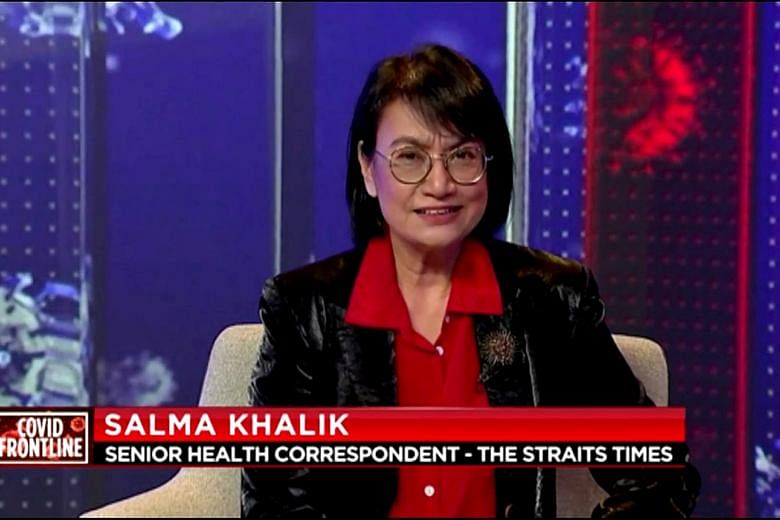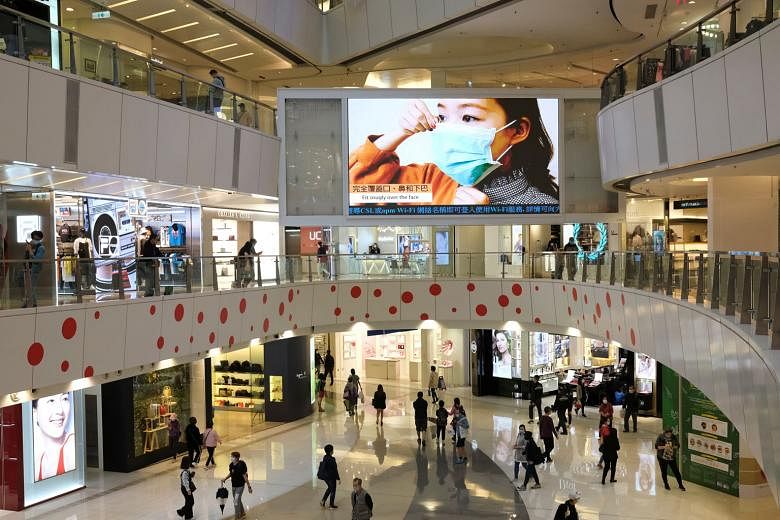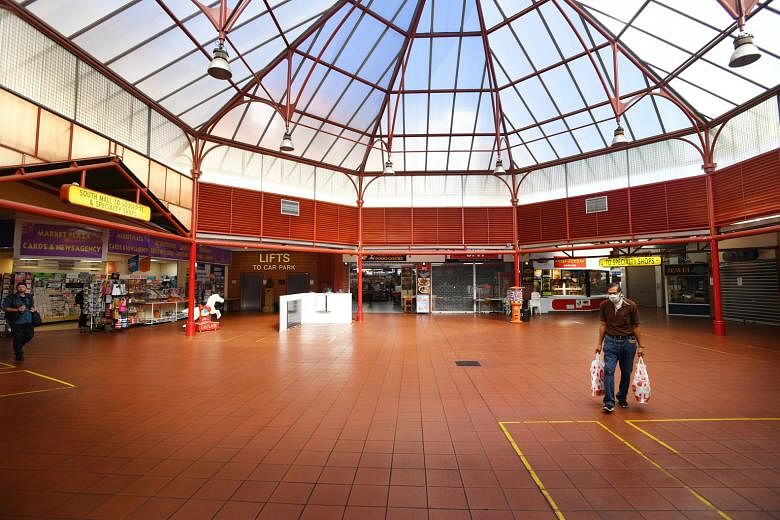The best method the world has now against the coronavirus outbreak is social distancing while waiting for a vaccine which might take a year to develop.
Experts discussed the spread of the coronavirus in the Asia-Pacific during a special Facebook Watch news event which began at noon yesterday and was co-hosted by The Straits Times, the South China Morning Post (SCMP) in Hong Kong and Australian television news channel 7News.
It was also streamed live on The Straits Times Facebook page.
The 45-minute event saw ST senior health correspondent Salma Khalik reporting on the situation in Singapore, SCMP chief news editor Yonden Lhatoo leading Hong Kong-based interviews, and Mr Michael Usher, national anchor for 7news, conducting interviews from Australia.
They were joined by experts Alex Cook, vice-dean for research at the National University of Singapore's (NUS) Saw Swee Hock School of Public Health; Wang Linfa, director of the programme in emerging infectious diseases at the Duke-NUS Medical School; David Hui, respiratory expert from the Chinese University of Hong Kong; John Nicholls, pathologist at Hong Kong University; Mary-Louise McLaws, epidemiologist and current adviser to the World Health Organisation; Sanjaya Senanayake, associate professor of medicine at the Australian National University; and Rachel Blundy, fact check editor for international news agency Agence France-Presse.
Singapore's National Development Minister Lawrence Wong and Australia's Prime Minister Scott Morrison also made appearances during the discussion.
Mr Morrison said: "This is not something that just comes and goes in a couple of weeks. This is going to be a whole new normal for Australia.
"So (this will last) for some time to come, we think six months is the most reasonable estimate at the moment. I certainly hope that it might be sooner than that, but it could also be longer."
Experts also said the virus might be seasonal, but this remains to be proven.
Professor Nicholls noted: "Both this coronavirus and also Sars (severe acute respiratory syndrome) did emerge in winter. So, it does tend to indicate that this may be seasonal... In the laboratory, we've shown that this virus is very temperature-dependent - it's very stable at cold temperatures, but at warm temperatures, it can actually be inactivated. The question is what happens outside the lab, in the environment?"
He added that weather modellers have seen that the virus seems to be more transmissible in cold weather.
"We do hope that in the summer period, it will decrease in the northern hemisphere, but the bad news is that it may then increase in the southern hemisphere," he said.
"The best method which we have now, which has been used all around the world, is the social measures (such as) social distancing and quarantining. That's about the best that we have to try and keep this virus at bay."
This is especially since there are no effective anti-viral treatments or vaccines yet. Professor McLaws said: "We don't have a vaccine for at least 12 months or even 18 months - for it to get to manufacturing and then to roll it out. We don't have very good therapeutics yet.
"But what we do have is social isolation and cooperation. I think we've heard from Singapore that that one is incredibly important and may be their tipping point for preventing them from having an explosion of numbers."
Another issue is that the virus can linger in the air after someone who is infected sneezes or coughs.
-
Experts answer questions from online viewers
-
Q When will we get a vaccine and how well will it work?
Professor Wang Linfa We have so many different patients and no single treatment is going to work for every patient. For most people, the most important development will be the vaccine.
The phase one clinical trial already started a week ago in the United States and in China.
But it's really important to differentiate between a vaccine candidate versus a licensed vaccine. For a licensed vaccine for mass vaccination, we're looking at at least six to 12 months from now.
Q Why do children have milder cases when they have fewer antibodies than older people?
Associate Professor Sanjaya Senanayake We don't actually know the answer.
There are some possibilities, though. The first one is that the virus likes to get into cells through an ACE-2 receptor. It may be that children have less ACE-2 receptors in their lungs compared with their upper respiratory tract, which could explain the milder disease.
As we get older, our immune systems get weaker. Is it that young children and young adults have strong immune systems and older people have weaker ones? That's a possibility, but we are seeing young adults get very sick (with Covid-19), so it doesn't explain the whole picture.
Q If a person has recovered from the virus, will he or she be immune to it?
Prof Wang Yes. We just did a study in Singapore. The last coronavirus outbreak was the Sars virus, and we just recalled these Sars survivors 17 years later; we still found that they have very strong antibody protection against the Sars virus.
Although Covid-19 is different, it's a very close cousin to the Sars coronavirus, so we believe that it's going to be similar.
Once somebody has recovered from Covid-19, he should be protected for many years.
Q Are my pets in danger of getting the virus?
Prof Senanayake Three dogs have been found to have been infected with the virus and they had owners who had the infection.
In Belgium, we recently had a cat that's been infected with the virus and had some diarrhoea, vomiting and some difficulty breathing.
Having said that, there's no evidence at this stage that pets can transmit this to humans. We'll keep watching this outbreak and see if that changes, but at this moment, it seems unlikely.
Rei Kurohi
"After being aerosolised, the virus can survive for about three hours," said Dr Hui.
He added that the virus can survive for about three days when it lands on plastic or steel surfaces, but only a day when it lands on cardboard.
Associate Professor Senanayake noted that although the virus has a number of different strains, it does not affect its clinical features.
"So the Covid-19 virus, Sars-CoV-2, has a genome with 30,000 base pairs, and the changes have occurred on 11 base pairs.
"That's very small, so for all intents and purposes, even though they're different strains, they're technically really still the same virus and will have the same effect on people and shouldn't affect any vaccine development."













